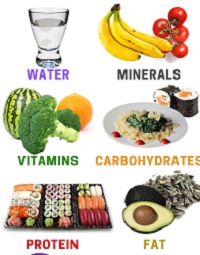The 6 classes of food and their functions in the human body
The 6 classes of food and their functions in the human body

Food is defined as any ingested substance capable of providing nutritional support and value.
Eating nutritious food keeps you healthy, which means you should include a balanced diet in your regular meal routine.
Checkout >>>
What is a well-balanced diet? Classes of food
A balanced diet includes all six food groups in the proper proportions.
Despite the vast volume of food consumed around the world, it can be categorized into only six types.
It’s not enough to have a well-balanced diet; you also need to eat the right foods in the right proportions.
What we eat makes us who we are. That is why it is critical to eat healthily, and fortunately for us, science can assist us in this endeavor.
Did you know that the foods we eat can be classified based on their nutritional value?
Protein, carbs, minerals, fats, water, and vitamins are among the dietary resources found in the various food classes.
The nutrients you obtain from the food and drinks you ingest are fortified in your body. Food is vital to one’s health, and all nutrients must be digested before they can be utilized by the body.
Food has significant roles in the body, such as repairing bodily tissues, nourishing the body, supplying energy, activating growth, and so on.
Continue reading to learn about the various types of food, as well as their functions and sources.
Thus, how many different types of food are there?
There are six basic components to the food classification system that we utilize. “Food substances” are the components that make up any product. Substances found in food include:
- protein (animal and vegetable).
- Carbohydrates (simple and complex, including fiber).
- Fats (saturated and unsaturated).
- Vitamins (fat-soluble and water-soluble)
- Minerals
All food categories and their functions with examples are mentioned below:
The classification of the basic food list is:
- Carbohydrate
Carbohydrates are a type of food that provides energy. Carbohydrates are one of the most important food groups, and they play an important role in the human body.
Bread, sugar, starchy foods, and grains are examples of carbohydrate foods. They are an important source of fuel for the body and brain function.
- Protein
Protein is commonly referred to as “bodybuilding food.” It is a type of diet that aids in the formation of new tissue. It also provides the body with the necessary fuel.
Protein aids the body’s metabolism while also strengthening the immune system. It has been shown in numerous studies to reduce hunger and improve brain function.
Protein can be found in nuts, beans, meat, milk, fish, and other foods.
- Fat
Fat is required for the body’s metabolic and structural functions. It is a type of food that has a variety of functions. Fat is responsible for storing energy in the body.
It also contributes to the health of the skin. Fat also protects key body organs. It also makes it easier for the body’s cells to function properly.
Olive oil, salmon, sunflower seeds, leafy vegetables, and other sources of fat
- Vitamin
Vitamins are chemical substances that are required in minute amounts for the proper functioning of the body’s metabolic processes. It is a type of diet that promotes effective systemic processes while also promoting cell growth.
A vitamin shortage or absence can harm the body and impede growth. Vitamins also aid in the maintenance of cell and tissue health.
Source – meat, dairy products, eggs, and fruits, among other things.
- Mineral
The body needs minerals to function properly. Minerals are dietary groups that have a role in a variety of metabolic processes.
They aid in the strengthening of teeth and bones, as well as the conversion of food into energy.
Source includes – bread, fish, milk, fruit, and other foods.
- Water
In the human body, water is essential. It is a type of meal that transports nutrients throughout the body. It also aids in the maintenance of homeostasis and the prevention of dehydration. Water also aids in the excretory process.
Each food class’s functions: Functions of Each Class of Food
carbohydrate
- Carbohydrates supply energy to your body, which is one of their primary purposes.
- Carbohydrates help to maintain muscle mass and promote digestive health.
- They also have an impact on heart health.
Proteins
- Protein is a primary energy source. If you eat more protein than your body requires for tissue preservation and other necessary processes, your body will convert it to energy.
- Proteins play an important role in the transport of some compounds. Hemoglobin, for example, is a protein that carries oxygen throughout the body.
- Protein helps to prevent infection, sickness, and disease by forming antibodies.
- They are necessary for body growth, maintenance, and health because they help the body produce hormones, antibodies, and other vital components that require protein.
Fats
- Aids in the formation of new cells and muscular growth. Fats and oil are crucial for the human diet since they are key sources of energy.
- Fat and oil are potent anti-inflammatory agents that reduce the risk of arthritis, Alzheimer’s disease, and cancer.
Vitamins
- Are necessary for infection prevention. We need vitamins for good vision, skin health, and strong bones.
- They are efficient cancer prevention agents and lower the risk of lung and prostate cancer.
- Vitamins such as vitamin C support the body’s recovery process by boosting the safe base.
Minerals:
- They are necessary for a human’s functions, such as the formation of strong bones and teeth.
- Minerals keep your digestion in check and help you stay hydrated.
- They aid in the strengthening of bones and the transmission of nerve signals.
Water
- Increases the capacity of your cerebrum and improves your mood. It acts as a defender and an ointment in the body. It also helps the body to rid itself of contaminants.
- Water aids in the transfer of vitamins to cells, as well as hydration and clogging prevention.
- It also helps the body with absorption, body temperature regulation, reproduction, food transit, oxygen transport, and other chemical issues.
- Water is necessary for the circulation of nutrients, oxygen, blood, and other bodily fluids. It promotes brain function, eliminates toxins, and increases body vitality when ingested.
Summary
So, the next time you put something into your body, keep an eye out for these dietary groups and remember their critical purposes.
Meanwhile, if you have any queries, please leave them in the comments section below.
A heart full of gratitude


